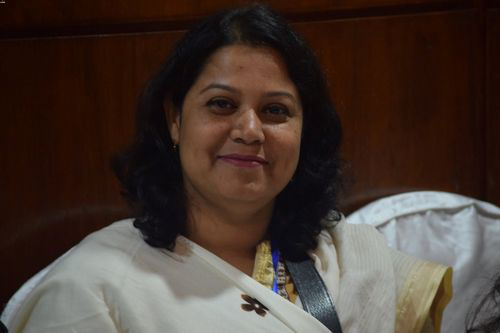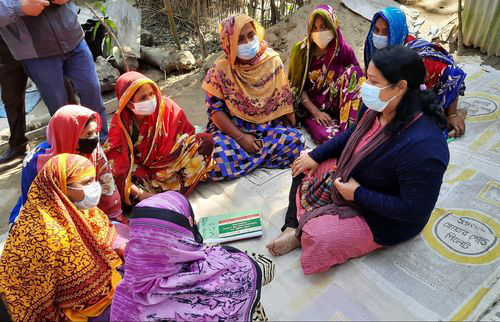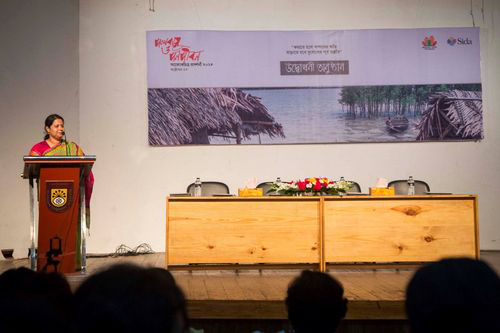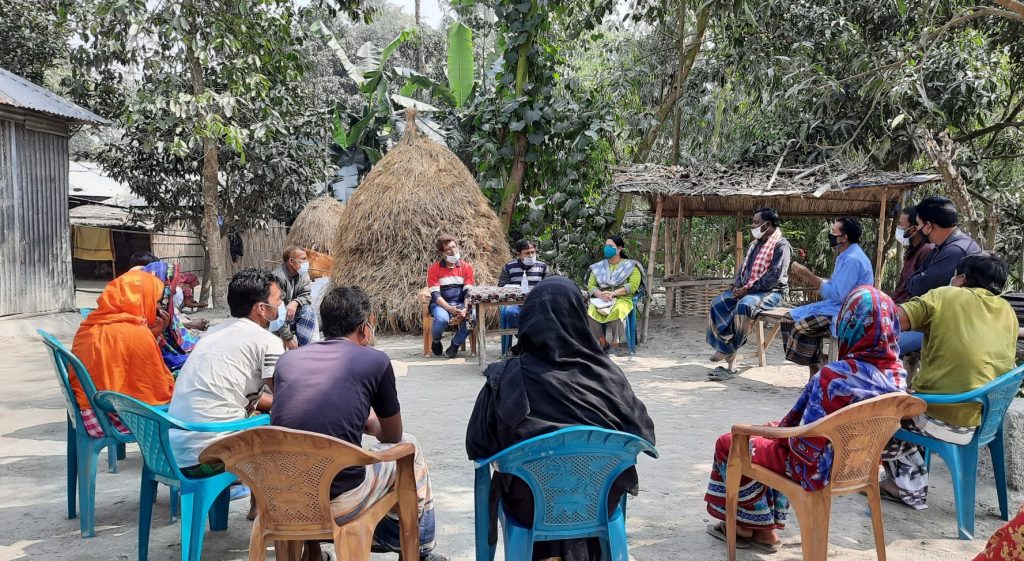In this interview Zakia Naznin, Flood Resilience Programme Manager with Concern Worldwide in Bangladesh, talks through her experience as a woman leader. She describes the women who inspire her, what she thinks makes a good leader, and advocates for more support to women leaders in Bangladesh.

Zakia Naznin is the Programme Manager for the Flood Resilience Project implemented by Concern Worldwide in Bangladesh. The Flood Resilience Project is a part of the Zurich Flood Resilience Alliance – a multi-sectoral partnership of humanitarian, NGO, research, and private sector partners that is focused on finding practical ways to help communities in developed and developing countries strengthen their resilience to flood risk. This interview was conducted by Finola Mohan, Programme Knowledge and Learning Adviser from Concern Worldwide, based in Concern’s HQ in Dublin.
Zakia, please explain your role in the Zurich Flood Resilience Project in Bangladesh?
I’m the Programme Manager of the Flood Resilience Project in Char context for Concern Worldwide in Bangladesh.
The Chars are riverine islands and sand banks that can become flooded, cut off from the mainland and even entirely washed away by monsoon rains and other floods.
This project is using innovative tools including the Flood Resilience Measurement for Communities (FRMC) and participatory methods to produce flood resilience plans with communities. My role is to facilitate the process of developing these plans and to ensure the implementation of the programme.

I lead the project team which includes a Field Coordinator who works for Concern and a team of nine people who work for our partner organisation called ASOD (Assistance for Social Organization and Development).
Have you been a manager before?
Yes, before joining Concern I worked as a Deputy Programme Manager for a climate change adaptation project with a national organisation called Manusher Jonno Foundation. Before that, I worked as a Senior Research Officer for Bangladesh Centre for Advanced Studies (BCAS).
How do you feel about managing the team (including the partners)?
It’s true that according to social norms and practices of gender norms in Bangladesh you might expect challenges for women in leadership. But having this role within Concern, I really never feel like that. My management strategy is always to motivate my team to recognise that though we are working with different capacities and roles, from field facilitators to programme manager, all roles are important to achieve the project goal. It’s not because I’m a woman leader, or woman manager, but I create a respectful and enabling environment in terms of empowerment of every team member.
My management strategy is always to motivate my team to recognise that though we are working with different capacities and roles, all roles are important to achieve the project goal.
In this team, I’ve never experienced discrimination as a woman. They come to me for solutions and advice, so I know that they respect my opinion. This project uses a unique adaptive approach and we sit together to discuss changes to the work. I work closely with the team and they come to me for clarifications. They rely on me. I try to be honest to explain to them in the way I understand, and I think they appreciate that.
When you were studying and in your early career did you have female role models? What about them did you look up to?
I started my career working in Save the Children. That work was led by a woman called Rachel Kabir. She was very strong, but also understanding and kind. She understood everyone’s perspective. She was technically sound and a great leader. Since then, the image in my mind of a good leader is her.
In other organisations where I’ve worked there weren’t always women in senior management and the culture wasn’t always friendly to women. So I understand the difference in culture of organisations with and without women leadership.
I feel that women’s leadership should be promoted highly. In Bangladesh now there are many women leaders who work in gender focused roles, or in gender sensitive organisations. But there are still some areas where women leaders are really needed, such as the climate change adaptation space.
There should be more women leaders in technical areas.
I always thought that promoting women leadership is not only achieved through working on gender issues, but we need more women leaders in technical areas. It is coming slowly, but still there’s a gap.
Another example is that in Concern Worldwide in Bangladesh, we have many women in the senior management team, but they are all international staff. I think we need to do more work to get Bangladeshi women in senior positions. There are many competent women in Bangladesh who could perform in senior positions. In some cases, they need to be supported to increase their capacity, so I think there should be a strategy to recruit women leaders and build their capacity.
Why do you think having women in leadership matters?
Both men and women can be in leadership positions. In 2021 we should not be asking this question. We should be asking why not women leaders?!
My personal opinion is that women’s leadership is better than men’s. I have seen many women leaders whose management is not based on concepts of masculinity or wielding power, but is real leadership. Real leadership is about inspiring and getting the most out of a team to achieve their goals.
Both men and women can be in leadership positions. In 2021 we should not be asking this question. We should be asking why not women leaders?!
Having women in leadership roles give young girls someone to look up to. It inspires them. Concern Worldwide, Action Aid, Manush Jonno Foundation etc. are led by women and are doing really great. Young girls have examples in front of them. This is true for me as well. If someone wants to lead, they can do it. There will be challenges, but if women want to overcome this, they can and they can lead.

If this is read by any young professional, I want them to see that I’m leading a project for an international organisation – this position has something irrespective of men and women.
How has the reaction been to you being a leader of this project?
-in the community? When dealing with government officials? At home with your family? Have you had any struggles or difficulty in being a leader who is a woman, with the culture in Bangladesh?
When I visit any government office, or stakeholders, I’ve never felt that they looked differently at me. I always feel I’m accepted. However, I do appreciate that as a woman in this society I need to be mindful of my security and safety. This means that when I’m travelling to field locations, I’m aware that I need to get back to the hotel before dark. I always need to be cautious about where I stay and with whom I’m travelling. So I know that means there is potentially one difference between me and a man in the same role.
From my family perspective, I’m lucky that my husband is working for an INGO and is gender sensitised already. For example, I presented a session at the Gobeshona Global conference this year. My husband attended the session online. He was very proud of me – he texted me ‘great session, you are doing excellent work’. It was so nice to know my husband supports me in my work and my confidence was raised by this. I’m sure this doesn’t happen to all women managers. I know other colleagues who are woman leaders whose husbands are not happy when they travel for work and this pressure can be quite stressful.
They looked down on me and the other women we worked with.
When I was young and working in a team several years ago, I found it was more difficult as a woman team member to work with men leaders, especially those from a scientific background. I felt they were talking in a way that implied that “she’s a woman, so she won’t understand”, or “she understands less than men”. They looked down on me and the other women we worked with. But now, I don’t feel this way in the work I’m doing now. Through all of my experience, I have learned how to handle a team, partner, and workload and that has given me a strategy for what I need to do.
What advice would you give to other women who are interested in taking up leadership roles?
I would say to other young professionals, keep your passions, be strategic and believe in yourself. There are a lot of women who have struggled more that us in the earlier days. If we work well, if we go through this challenge, this will mean the next generation will go through less challenges.
It is not only for ourselves, but the whole of society and the next generation will benefit. We can overcome all the challenges. You need to be strategic and courageous and keep in mind that you can do it. It’s not true that there’s only barriers in your way. Not everyone is against you. There are people who want to see you in a leadership position. There are both positive and negative things, so go for the positives!

My mother wanted to have her own income source, she always told me “ok so you must have your own income so that you can make your own decisions, that is important”. She wasn’t able to do that herself. But she encouraged me to work for myself and to get a better education, which was difficult when having two kids but she always encouraged me to be an independent woman.
My son also benefits from seeing me in a decision-making role.
Now I don’t need to tell my daughter the same thing, because I’m an example for her. My son also benefits from seeing me in a decision-making role. How my husband considers my work and my decision making at household level -this shows him how a family should consider all members. In our household both my husband and myself work and share the household chores. So I hope our children do not get the impression that work is only for men and household chores are for women.
Have you any final thoughts you’d like to leave us with?
I always feel that my career is not only for me, but it is important that I play my role because for some people in my family and society I’m a role model.
I really feel that leadership does not equate with masculinity and power. Sometimes people say that women are emotional and considerate. Yes I’m emotional, but there’s nothing wrong with that. That is a strength. That’s not only important for women in leadership and gender equality, but in terms of good leadership in general. If a leader is emotional and considerate of their team members, then they are bringing respect to their role, which is important. When you are emotional it helps you to understand other people. This is important for humanity and human rights.
Sometimes I hear that I‘m emotional – I’m fine with that!
Monday 8 March is International Women’s day and the Zurich Flood Resilience Alliance is celebrating women leaders in the organisations and communities we work with. If you want to hear from more inspiring women in leadership roles follow us on twitter at @floodallliance and check out our other blogs.

Comments